This past Thursday, staff writer Jeffrey Ndubisi attended “Shakespeare in Translation?,” presented by the King’s Crown Shakespeare Troupe and the Center for American Studies. The two-hour event, hosted in Barnard Hall’s Held Auditorium, featured a conversation between Professors John McWhorter and James Shapiro of the Linguistics and English departments, respectively. All throughout the event, KCST performers presented four scenes from two separate works of Shakespeare – one that stuck to Shakespeare’s original script, and another that was “modernized” in some fashion.
Will Cagle (CC ’20), Hugo Wehe (CC ’19), and India Beer (BC’ 20) took on the first two scenes of the evening, excerpted from Shakespeare’s “Two Noble Kinsmen,” directed by Karinya Ghiara (CC ’19). Cagle and Wehe took on the roles of cousins Palamon and Arcite, as Beer played Theban nobleman Valerius. The first scene was performed with the original script; the second immediately followed and was performed with a “modern-language adaptation” by American playwright Tim Slover. For the second set of scenes, Cagle, Wehe, and Beer were joined by Rose Meriam (CC ’19) and Isabel Daly (BC ’19) for a scene from “Macbeth,” also directed by Ghiara. Beer performed as Duncan, King of Scotland, while Cagle and Wehe played Lennox and Malcolm – Duncan’s attendant and eldest son, respectively. Meriam portrayed a bloodied captain, as the role of Ross was filed by Daly. Again, the first scene featured Shakespeare’s original text, while the second again immediately followed with playwright Conrad Stoke’s “10% Translation.”
The professors’ conversation and subsequent Q&A, moderated by KCST members Luke Cregan (CC ’19), Juliet Emerson-Colvin (BC ’21), and Sophia Seidenberg (BC ’19), made much of what would be “lost” or “gained” by modifying Shakespeare. Shapiro lamented the possible loss of the “music” of the works, saying that in adapting these plays for audiences, important minutiae would be overlooked. In the case of the “Kinsmen” scene, Shapiro commented on how Shakespeare’s words brought forth the intended dullness of the characters portrayed in the scene, while the modern translation failed to aptly demonstrate the characters’ close familial ties the way Shakespeare did by having the characters finish the others’ thoughts. Contrast that to McWhorter, who was concerned about the comprehensibility of the works. In the same scene, he took issue with the phrase “are you not out?” because of its lack of clarity. Given enough time, he argued, the phrase could be read and made sense of. But in the context of a contemporary performance, the phrase lacks the immediate clarity that a phrase like “are you insane?” has. Thus, the meaning is lost on an audience trying to resolve multiple phrases and words as arcane as that one as they appear “every twenty seconds.”
(It must be noted, though, that neither professor could stop noting how great the KCST performances were. It was comic, in a way – immediately after saying something that was supposed to demonstrate the weakness of the others’ argument as it related to performances of Shakespeare’s work, the very next words out of either man’s mouth could effectively be summed up in five words: “but YOU guys were great.” And, in all fairness, they were. They really, really were.)
The pair engaged the audience not only in the arguments they made, but also in how they made their arguments. Shapiro had a few supporting anecdotes, including one about an experience he had rehearsing an abridged version of Hamlet with a group of inmates at a New York state prison. In defense of leaving the texts as they are, he said that while the line “might his quietus make with a bare bodkin” in Hamlet’s “to be or not to be” soliloquy might have been lost on most, the actor’s choice to couple that line with a rolling up of his sleeves and fist clench communicated the line as it needed to be communicated. Meanwhile, in defense of even a touch of adaptation, McWhorter spoke about how in interacting with students from other countries for whom English was not a native tongue, some of Shakespeare’s works seemed more near and dear to their hearts as opposed to those raised on Shakespeare’s original English words.
Apart from the performances, audience members were also treated to a short history of the uses of the word “quarry” vs “quarrel” in the many printed editions of “Macbeth”; Shapiro deeming the musical “Hamilton” modern-day Shakespearean; McWhorter’s short Music Hum lesson on the “tritone”; and nearer to the end, a few moments of agreement. Both McWhorter and Shapiro seem to think that different translations and adaptations of Shakespeare serve different (and often limited) purposes, whether that be to effectively impart plot and context to audiences or to get a better grasp on a play’s “score,” or “music.” Both also believe that the American theater audiences who watch Shakespeare with hushed lips and a pronounced degree of solemnity need to “loosen up.” (After all, a good deal of Shakespeare’s audience members were downright rowdy.)
The evening invited wide-ranging discussions of elitist and classist motives in preserving Shakespeare’s original words, the disparate (and often limited) use cases of translations, the Shakespeare of the page and of the stage, the versatility of subliminal processes in comprehending the plays in their original wording, and a host of other topics. All things considered, it was a good two hours spent, and this “experiment” – as both men referred to the evening as – was well conducted.
- Original text, “Two Noble Kinsmen.” From left: Cagle as Palamon; Wehe as Arcite.
- In conversation. From left: James Shapiro, John McWhorter, Sophia Seidenberg, Karinya Ghiara.
- “10% Translation,” “Macbeth.” From left: Cagle as Lennox; Beer as Duncan; Wehe as Malcolm; Daly as Ross.
- From left: Meriam, Cagle, Beer, Wehe, Daly.
- McWhorter and Shapiro fielding questions.
- Shapiro in conversation with a graduate student after the event.
images via Jeffrey Ndubisi


 2 Comments
2 Comments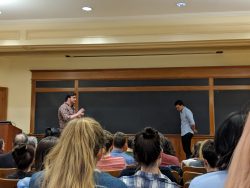
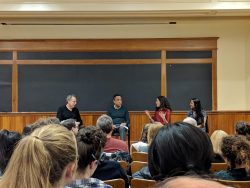
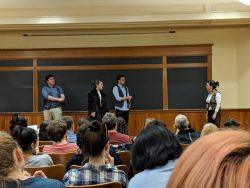
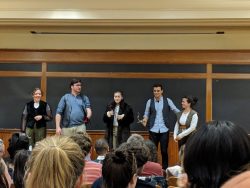
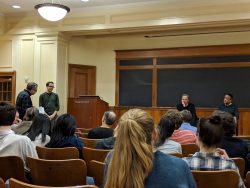
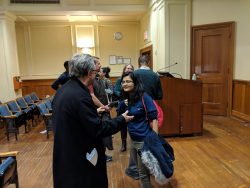

2 Comments
@Anonymous What an excellent review! Bravo 👏🏽✨
@Anonymous The word sycophant means slander in Greek and French but Shakespeare made it mean flatter.